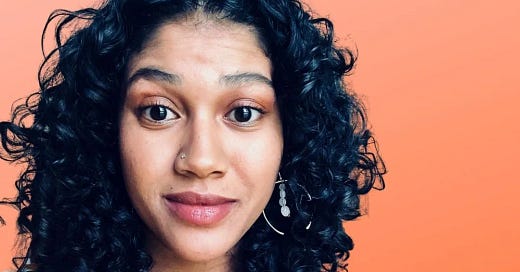Meet the Team: Dr. Nadejda Webb
This month, meet Dr. Webb, ACLS Emerging Voices Postdoctoral Fellow, the brains behind the upcoming Who Owns Black Data? Symposium, and self-described "red cup of lavender tea."
In January 2024, we launched a new monthly series introducing followers to some of our members. See past posts here and here.
Who are you and what do you do with LifexCode?
The initial part of this question makes me think of something I wrote a few years ago: “Nadejda Webb isn’t human. She was conceived in Moscow, Russia to two almost humans, and grew up in Kingston, Jamaica, attempting to incubate a humanity she hasn’t found. She is, however, a dancing flower, red cups of lavender tea, napalmed land and a smiling pig.” This reflection continues to capture much of what I feel as a being who grew up in the aftermath of various systems, grappling with processes of racialization and valuation. The “correct” answer to this question is that I am an ACLS Emerging Voices Postdoctoral fellow in Black Data and the Black Digital Humanities. I will transition to the role of Assistant Director of LifexCode and a Visiting Assistant Professor in the Center for Digital Humanities at Johns Hopkins in July. In my current role, I’ve supported the implementation of community centered workshops and programming developed by one of our community partners, Muse 360.
With artist, cultural worker, and founder of Muse 360, Ms. Sharayna Christmas, I am also co-teaching a community-engaged course, “Black Women Artists, Social Change and Baltimore.” Through direct engagement with Black women cultural workers, including in-class conversations, oral history collection, and site visits, we probe tensions between written and experiential histories, query the processes of epistemological (re)production, and investigate the relationships between art-making, memory, and social change. A description of the roles I serve, however, cannot convey the totality of who I am.
Tell us about your lab or project and why it is digital humanities against enclosure.
The We Live Language (WLL) Lab is grounded in the writing and spoken word of Afro-diasporic Black Women poets, authors, and philosophers, and probes the relationship between language and power. Below, I share some details about one of our digital archive projects, the Black Women Cultural Workers Archive (BWCWa), co-visioned with Ms. Christmas.
BWCWa aims to collect, transcribe, and digitally archive the narratives, processes, and papers of Black women cultural workers whose labor has been crucial to community uplift in Baltimore since 1964, but whose stories have not been recorded. BWCWa utilizes oral history to recognize and apprehend varied ways of (re)imagining and enacting dignified relations within the wake of enslavement, enabling us to simultaneously remember the past and narrativize the present to continue the creation of Black futures. Focusing on Black Women Cultural Workers foregrounds an invisibilized history of local Black artists, activists, educators, and quotidian changemakers whose collective oeuvre, extending out of a praxis of care, disrupts and reconfigures a dominant narrative of Baltimore as a city marked by unknowing, neglect, poverty, and violence. By probing the multiple ways used by cultural workers to construct their inner worlds, BWCWa aims to hold and demarcate the internal processes that gave way to community uplift and structural development.
What is one piece of media (text, art, music, really anything) that inspires your work?
Joyce J. Scott’s “Mammie Wada” (1981) is on my mind. As I contemplate this piece, I am reminded of the power of memory to anchor and water as a container to hold. Intergenerational practices have kept Mami Wata alive throughout the Diaspora; I am continually inspired by the practices of Diaspora that keep us.
What DH tools, methods, or theories do you recommend for folks exploring digital humanities against enclosure?
I would suggest checking out Doing Black Digital Humanities with Radical Intentionality (2023) by Catherine Knight Steele, Jessica H. Lu and Kevin C. Winstead. The website for the upcoming Who Owns Black Data? Slavery and Data conference, particularly the Prelude section, is a useful reference point for conversations around ownership, DH practice and data. There is also a Just Tech Zotero library that could be a useful touchpoint for exploration as the sections cover a variety of topics.
What do you like to do in your free time or how do you recharge? We prioritize rest as part of our decolonial praxis.
I love my family dearly. They form a pocket of rest, joy and revitalization.
Note: you can register for the Who Owns Black Data? symposium, including virtual attendance, here.






